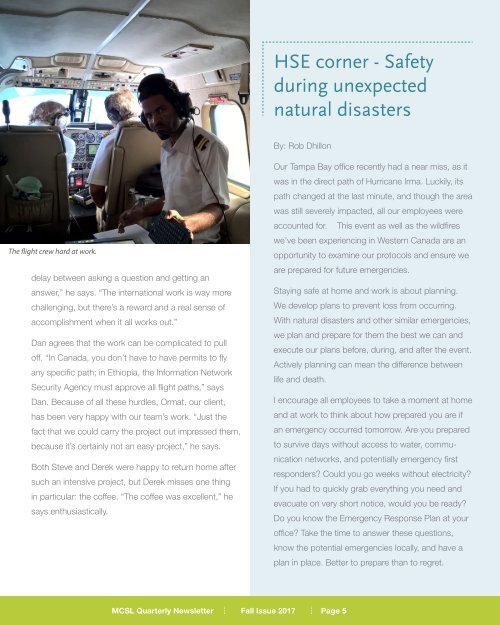Newsfeed_Spring 2017
You also want an ePaper? Increase the reach of your titles
YUMPU automatically turns print PDFs into web optimized ePapers that Google loves.
HSE corner - Safety<br />
during unexpected<br />
natural disasters<br />
By: Rob Dhillon<br />
The flight crew hard at work.<br />
delay between asking a question and getting an<br />
answer,” he says. “The international work is way more<br />
challenging, but there’s a reward and a real sense of<br />
accomplishment when it all works out.”<br />
Dan agrees that the work can be complicated to pull<br />
off. “In Canada, you don’t have to have permits to fly<br />
any specific path; in Ethiopia, the Information Network<br />
Security Agency must approve all flight paths,” says<br />
Dan. Because of all these hurdles, Ormat, our client,<br />
has been very happy with our team’s work. “Just the<br />
fact that we could carry the project out impressed them,<br />
because it’s certainly not an easy project,” he says.<br />
Both Steve and Derek were happy to return home after<br />
such an intensive project, but Derek misses one thing<br />
in particular: the coffee. “The coffee was excellent,” he<br />
says enthusiastically.<br />
Our Tampa Bay office recently had a near miss, as it<br />
was in the direct path of Hurricane Irma. Luckily, its<br />
path changed at the last minute, and though the area<br />
was still severely impacted, all our employees were<br />
accounted for. This event as well as the wildfires<br />
we’ve been experiencing in Western Canada are an<br />
opportunity to examine our protocols and ensure we<br />
are prepared for future emergencies.<br />
Staying safe at home and work is about planning.<br />
We develop plans to prevent loss from occurring.<br />
With natural disasters and other similar emergencies,<br />
we plan and prepare for them the best we can and<br />
execute our plans before, during, and after the event.<br />
Actively planning can mean the difference between<br />
life and death.<br />
I encourage all employees to take a moment at home<br />
and at work to think about how prepared you are if<br />
an emergency occurred tomorrow. Are you prepared<br />
to survive days without access to water, communication<br />
networks, and potentially emergency first<br />
responders? Could you go weeks without electricity?<br />
If you had to quickly grab everything you need and<br />
evacuate on very short notice, would you be ready?<br />
Do you know the Emergency Response Plan at your<br />
office? Take the time to answer these questions,<br />
know the potential emergencies locally, and have a<br />
plan in place. Better to prepare than to regret.<br />
MCSL Quarterly Newsletter Fall Issue <strong>2017</strong><br />
Page 5



